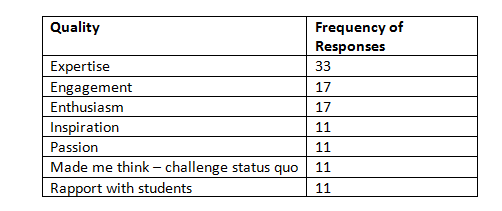When I was lecturing education students, I would ask them in their first class, who was their best teacher and why.
If they were training to be teachers, I wanted to know who inspired them, and what these teachers did that set them apart from the others.
The characteristics were varied, but usually centered around knowledge, personality, empathy and the ability to challenge them to reach their potential.
The topic of excellence in teaching has always fascinated me. From an early age, I was aware of the impact that outstanding teachers had in my life. These teachers recognised my talents and provided opportunities for them to be nurtured.
In my case, my talent was music and the persistence and encouragement of my teachers resulted in me completing a performance degree at the Conservatorium of Music. I then worked as a performer and teacher, and my own students have gone on to become performers and teachers. To me, the combination of care and the emphasis of the value of hard work and discipline are some of the contributing factors in teaching excellence.
Last year, I completed a study that looked into the characteristics of outstanding university lecturers. My expectation was that the study would show clear trends, or reveal an aspect of excellence in teaching not yet discovered by teacher training institutions. There was also an assumption that excellent teachers were ‘born’ not ‘made’ and teaching was an innate skill. Lecturing staff still suffered the stigma of not having their teaching work valued as highly as that of the researchers, on which the reputation of the university relied.
Surveys were sent out to 70 lecturers who were enrolled in the Graduate Certificate of Tertiary Learning and Teaching. Sixty-five responses (92.85 per cent) were received, collected and tabulated. The most frequent responses are shown in Table 1.
Table 1. Frequency of responses to qualities of outstanding lecturers.

The table above shows that the skill of expertise is ranked most highly. This is of little surprise, as university lecturers are expected to be experts in their field.
The research showed that an excellent primary or secondary teacher may have expertise in a particular field, but not to the extent of someone working in the tertiary sector. It is the personality of the teacher which made a large impact.
The remaining qualities in the list, other than ‘made me think – challenge status quo’, are personal attributes. These are the ways that the lecturer engages with the material and communicates the ideas. A teacher who is excited by what they do has a positive impact on a class and makes students eager to learn.
The characteristic ‘made me think – challenge the status quo’ is an action which I deem essential in the tertiary learning sphere.
Universities are places where one’s thinking is expanded and boundaries are pushed in order to advance society. To do this requires a lecturer to be able to critically reflect on current thinking and practice. Teachers who push boundaries in thinking may be seen as taking risks, but it is necessary if we want students who can be creative and innovative.
The above results represent a portion of the research project conducted in 2013. If you would like further information, please contact Sharon Lierse at sharon@sharonlierse.com
If you think back to your school days, who did you consider to be the best teachers?
Did these teachers display a particular set of characteristics?
Which characteristic did you find was most vital to the learning process, and why?



